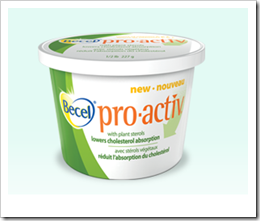You may have seen a number of products in the market lately with plant sterols (also known as phytosterols). What are they? Plant sterols are natural components that are found in certain foods that have a similar structure to cholesterol. They bind to cholesterol receptors in the body making them unavailable to bind and absorb dietary cholesterol. As a result, cholesterol passes through the body unabsorbed which helps lower blood cholesterol. Hence, these foods may be beneficial to people who need to watch or lower their cholesterol levels.
Keep in mind that total dietary fat (specifically saturated fat) also has an effect on blood cholesterol levels so even though plant sterols can have a positive impact on cholesterol levels, it’s still important to watch the total amount of fat in your diet. Switching to healthier fats (such as margarine instead of butter) and avoiding foods that are high in saturated fat is still recommended. Plant sterols naturally occur in a number of foods such as okra, legumes, nuts and seeds. These foods also have the added benefit of containing fibre and other vitamins and nutrients.
However, having said that, depending on your preference or lifestyle it might be worthwhile to increase your consumption of legumes, nuts and seeds for their phytosterol content or pay a little more for a margarine that contains plant sterols. If you are already following a healthy diet and want to improve on it even more, switching to a calorie-reduced margarine with plant sterols such as Becel pro.activ may be the way to go.
Check out Health Canada’s website for more information on plant sterols. For more information on pro.activ, visit the Becel website.
And if you live in Ontario and are interested in talking to a dietitian, there is as service called EatRight Ontario – a nutrition call centre where you can speak with a dietitian (the service is complimentary for residents of Ontario).
